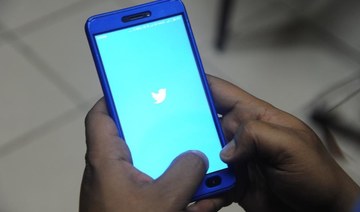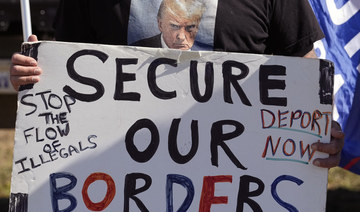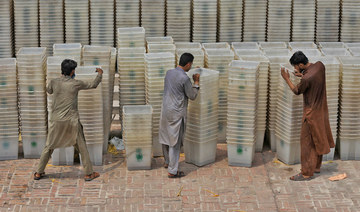NEW DELHI: When Vinod K. Jose, executive editor of The Caravan, India’s leading investigating magazine, logged onto Twitter on Monday, he was shocked to find the magazine’s account blocked.
Jose was already dealing with a case of sedition and other charges against him, the magazine owners and a freelance journalist. At the heart of the allegations is the magazine’s coverage of the ongoing farmers’ protests that have gripped India for more than two months.
As the farmers camp out at the edges of the capital, protesting new agricultural laws they say will devastate their earnings, the mainstream and social media have come under unprecedented attacks from Prime Minister Narendra Modi’s Bharatiya Janata Party. Critics say it has used the massive demonstrations to escalate a crackdown on free speech, detaining journalists and freezing Twitter accounts.
“It’s a very chilling development for the press,” said Apar Gupta, executive director of the Internet Freedom Foundation, a digital rights advocacy group.
Jose shared a screenshot of the blocked account from his personal handle. Soon outrage ensued.
Activists, journalists and media watchdogs rushed to condemn Twitter, which said it had acted upon a “valid legal request” issued by an Indian authority.
Hundreds of Indian Twitter accounts, including those of news websites, activists and a farmers’ union, were suspended on Monday. Some, including The Caravan’s, have since been restored.
Offline, at least nine journalists have been charged in the last few weeks for covering the protests.
The trigger for the clampdown was the death of a protester, Navneet Singh, when the largely peaceful rallies turned violent on Jan. 26 after a group of farmers veered from an agreed protest route and stormed New Delhi’s 17th century Red Fort. Hundreds of police and farmers were injured in clashes.
Farmer leaders condemned the violence but refused to call off the protest.
Authorities say no shots were fired and that Singh died because his tractor overturned. His family alleged he was fatally shot. Their account has been published by several outlets, including The Caravan.
Ministers in Modi’s government accused the journalists and a prominent opposition parliamentarian of inciting hatred and endangering the nation’s integrity through inaccurate reporting and tweets. It led to the filing of colonial-era sedition charges, which carry a maximum five-year prison term.
The law, like its equivalent in other former British colonies, is viewed as draconian and was revoked in the United Kingdom in 2010.
Prosecutions on sedition charges are rare but their use to silence journalists, critics and dissenters in India isn’t new and previous governments had resorted to it. But official data shows that Modi’s government has used the law more than any other — up by nearly 30%. It has also repeatedly rejected demands to repeal it.
Calls and messages seeking comment from four BJP spokespersons went unanswered, Calls to the party’s media office also were unsuccessful.
Media watchdogs and rights groups, including Human Rights Watch, condemned the government’s actions as censorship. The Editors Guild of India said the cases against journalists were “an attempt to intimidate, harass, browbeat, and stifle the media.”
Daniel Bastard, the head of Reporters Without Borders’ Asia-Pacific desk, said the government was trying to impose its own narrative.
Critics say India under Modi is growing intolerant. Its ranking on the World Press Freedom Index has fallen every year, and it ranked 142nd out of 180 places in 2020.
Reporters Without Borders noted “police violence against journalists” and increased “pressure on the media to toe the Hindu nationalist government’s line” as a major reason for the demotion.
But similarly, Twitter’s reaction of suspending accounts has also “set a terrible precedent” for free speech and press, said Jose.
“We like Twitter to stand neutral as opposed to being vulnerable to the pressures of power,” he said.
India’s Ministry of Electronics and Information Technology in its notice to Twitter on Monday said that it directed the company to take down accounts that had used incendiary hashtags during the Jan. 26 violence. But Jose said The Caravan never used such hashtags and that Twitter did not notify the magazine before suspending its account.
The ministry did not respond to calls and emails but issued another statement Wednesday, accusing Twitter of “unilaterally” restoring the accounts “despite orders to withhold them.”
It said the platform had to adhere to the authorities’ directions and may face criminal charges “for not complying with government orders.”
Twitter declined to comment.
Gupta from Internet Freedom Foundation said the IT law the government invoked to freeze the Twitter accounts gives it the power to direct online intermediaries and Internet service providers to block certain content without providing any explanation.
“In the past, governments have blocked individual journalistic accounts, but the blocking of an account of an entire publication is a level of escalation,” said Gupta.
The government’s response to the farmer protests has gone beyond India’s borders.
On Wednesday, India’s Ministry of External Affairs condemned “vested interest groups trying to enforce their agenda” after pop star Rihanna and teenage climate activist Greta Thunberg tweeted in support of the protests.
Entertainers in India haven’t been spared either.
On Jan. 1, Muslim comedian Munawar Faruqui was arrested for allegedly insulting Hindu sentiments while performing in Indore, a city in Madhya Pradesh state that’s ruled by Modi’s party.
In India, intentionally hurting religious sentiments is a criminal offense. But Faruqui was arrested preemptively before his performance even began.
“Before he could even make the joke, before he could even really start the show, police came and dragged him away,” said Anshuman Shrivastava, Faruqui’s lawyer.
The show was canceled and police have since admitted they have no evidence against the comic. He was granted temporary bail by the Supreme Court on Friday, after three lower courts refused to do so.
The Associated Press reached out to five prominent comedians who didn’t want to speak on record but said they were increasingly scared of making jokes against the government and Hindu religion.
“What we are witnessing right now is a blatant violation of free speech in India, which the government has legitimized in full public view,” said Sanjay Rajoura, a prominent Indian satirist. “The government first came after Muslims because they are an easily visible minority. But now it is coming after anyone who has an informed, intelligent expression.”
The ire of Hindu nationalist groups aligned with Modi’s party has also caught streaming platforms off guard. Many of their shows have faced boycott calls and legal cases. Recently, the Supreme Court issued a notice to Amazon Prime over its show “Mirzapur” after a petition claimed it hurt cultural sentiments.
Such incidents haven’t inspired much faith in the courts, said The Caravan’s Jose. He and the owners are still battling criminal charges.
“I hope the courts see that the world is watching how the largest democracy’s judiciary defends personal liberties,” Jose said.
India clamps down on free speech to fight farmer protests
https://arab.news/v3tv2
India clamps down on free speech to fight farmer protests
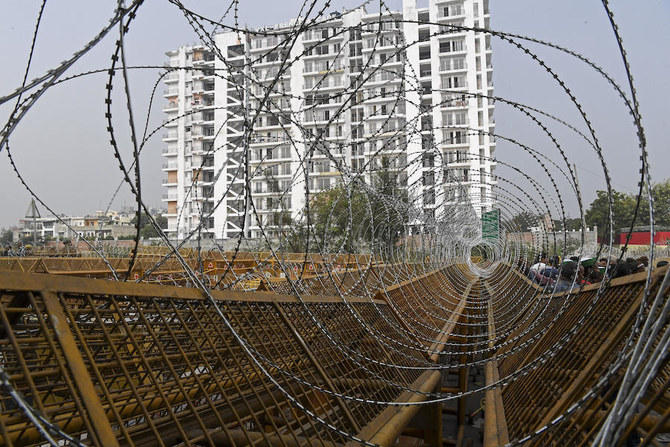
- Hundreds of Indian Twitter accounts, including those of news websites, activists and a farmers’ union, were suspended on Monday
- Activists, journalists and media watchdogs rushed to condemn Twitter’s action
Lebanese security forces arrest ‘TikTok influencer’ using platform to lure, assault minors

- Lebanese police say they arrested six, including three minors, involved in sexual assaults against minors
LONDON: Lebanese authorities arrested on Wednesday six people for their alleged involvement in sexual assaults on children, sometimes using the video-sharing platform TikTok to lure minors.
The Internal Security Forces said in a statement that among those arrested was a “TikTok influencer,” who is also a hairdresser, according to local media.
The six suspects are reportedly part of a criminal network comprising around 30 individuals involved in assaults against at least 30 children.
The Lebanese police said in a statement that “based on information obtained by the Cybercrime Bureau of the Judicial Police, and following a complaint lodged by a number of minors with the Public Prosecutor’s Office concerning sexual assaults, compromising photos and incitement to take drugs by members of a gang, the bureau in question has been able to arrest, to date, six people in Beirut, Mount Lebanon and North Lebanon.”
The arrested suspects also include three minors of Lebanese, Turkish, and Syrian nationalities who were active on TikTok, according to the statement.
Highlighting that the case has been probed for about a month, the Lebanese police vowed that “the investigation is continuing with a view to arresting all members of the gang.”
The head of the network, a famous TikTok personality, purportedly abused his fame and invited children to shoot TikTok videos with him, the independent Lebanese TV channel Al-Jadeed reported.
The TikToker would cut the children’s hair to gain their trust before inviting them to a party, where his accomplices sexually assaulted the children.
Violence against environmental journalists rises: Report

- State actors repsonsible for the attacks in most cases, says UNESCO
SANTIAGO: Journalists who report on environmental issues face increasing violence around the world from both state and private actors, UNESCO said on Thursday, highlighting that 44 of these journalists have been murdered between 2009 and 2023.
More than 70 percent of the 905 journalists the agency surveyed in 129 countries said they had been attacked, threatened or pressured, and that the violence against them had worsened — with 305 attacks reported in the last five years alone.
UNESCO, the UN cultural agency, listed in its report physical attacks such as injuries, arrests and harassment, as well as legal actions, including defamation lawsuits and criminal proceedings, among others.
At least 749 journalists, groups of journalists and media outlets have been attacked in 89 countries across all regions, its report said, with state actors being responsible for at least half and private for at least a quarter.
“State actors — police, military forces, government officials and employees, local authorities — are responsible for most of the attacks for which perpetrator information is available,” the report said.
These journalists were covering a wide range of topics, including protests, mining and land conflicts, logging and deforestation, extreme weather events, pollution and environmental damage, and the fossil fuel industry.
Men were more frequently attacked in general and women more frequently digitally, the report said.
Of the 44 journalists that were murdered in 15 countries while reporting on environmental issues, the report said only five cases resulted in convictions. Perpetrators remain unidentified in 19 of the 44 murders.
At least 24 journalists survived murder attempts.
UNESCO awards press prize to Palestinian journalists in Gaza

- UN director says prize is tribute to their courage
PARIS: UNESCO on Thursday awarded its world press freedom prize to all Palestinian journalists covering the war in Gaza, where Israel has been battling Hamas for more than six months.
“In these times of darkness and hopelessness, we wish to share a strong message of solidarity and recognition to those Palestinian journalists who are covering this crisis in such dramatic circumstances,” said Mauricio Weibel, chair of the international jury of media professionals.
“As humanity, we have a huge debt to their courage and commitment to freedom of expression.”
Audrey Azoulay, director general at the UN organization for education, science and culture, said the prize paid “tribute to the courage of journalists facing difficult and dangerous circumstances.”
According to the New York-based Committee to Protect Journalists (CPJ), at least 97 members of the press have been killed since the war broke out in October, 92 of whom were Palestinians.
The war started with Hamas’s unprecedented October 7 attack on Israel that resulted in the deaths of 1,170 people, mostly civilians, according to an AFP tally of Israeli official figures.
Israel estimates that 129 captives seized by militants during their attack remain in Gaza. The military says 34 of them are dead.
Israel’s retaliatory offensive against Hamas has killed at least 34,596 people in Gaza, mostly women and children, according to the Hamas-run territory’s health ministry.
Russian state media is posting more on TikTok ahead of the US presidential election, study says

- State-linked accounts are also active on other social media platforms and have a larger presence on Telegram and X than on TikTok, says Brookings Institution report
- The report comes after Biden last month signed legislation forcing TikTok’s parent company — China-based ByteDance — to sell the platform or face a ban in the US
Russian state-affiliated accounts have boosted their use of TikTok and are getting more engagement on the short-form video platform ahead of the US presidential election, according to a study published Thursday by the nonprofit Brookings Institution.
The report states that Russia is increasingly leveraging TikTok to disseminate Kremlin messages in both English and Spanish, with state-linked accounts posting far more frequently on the platform than they did two years ago.
Such accounts are also active on other social media platforms and have a larger presence on Telegram and X than on TikTok. However, the report says user engagement — such as likes, views and shares — on their posts has been much higher on TikTok than on either Telegram or X.
“The use of TikTok highlights a growing, but still not fully realized, avenue for Russia’s state-backed information apparatus to reach new, young audiences,” reads the report, which drew data from 70 different state-affiliated accounts and was authored by Valerie Wirtschafter, a Brookings fellow in foreign policy and its artificial intelligence initiative.
The study notes that most posts do not focus on US politics but other issues, like the war in Ukraine and NATO. However, those that do tend to feature more divisive topics like US policy on Israel and Russia, and questions around President Joe Biden’s age, the Brookings report says.
A TikTok spokesperson said the company has removed covert influence operations in the past and eliminated accounts, including 13 networks operating from Russia.
The spokesperson said TikTok also labels state-controlled media accounts and will expand that policy in the coming weeks “to further address accounts that attempt to reach communities outside their home country on current global events and affairs.”
The Brookings report comes after Biden last month signed legislation forcing TikTok’s parent company — China-based ByteDance — to sell the platform or face a ban in the US. The potential ban is expected to face legal challenges.
US media experts demand review of New York Times story on sexual violence by Hamas on Oct. 7
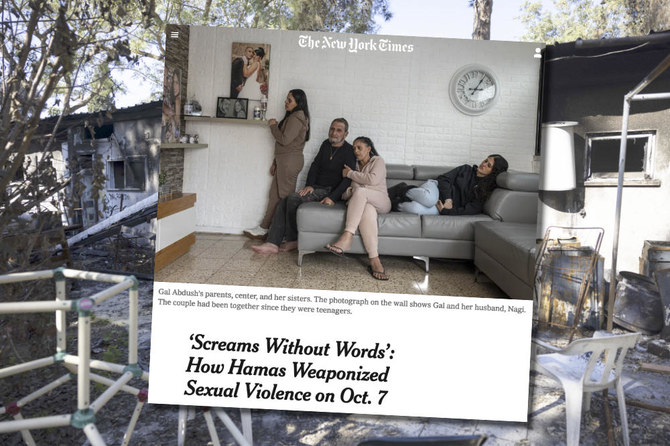
- 64 American journalism professionals sign letter accusing the newspaper of failing to do enough to investigate and confirm the evidence supporting the allegations in its story
- It concerns a story headlined ‘Screams Without Words: Sexual Violence on Oct. 7’ that ran on the front page of the newspaper on Dec. 28
CHICAGO: Sixty-four American journalism professionals signed a letter sent to New York Times bosses expressing concern about a story published by the newspaper that accused Palestinians of sexual violence against Israeli civilians during the Oct. 7 attacks.
It concerns a story headlined “Screams Without Words: Sexual Violence on Oct. 7” that ran on the front page of the newspaper on Dec. 28 last year.
In the letter, addressed to Arthur G. Sulzberger, chairperson of The New York Times Co., and copied to executive editors Joseph Kahn and Philip Pan, the journalism professionals, who included Christians, Muslims and Jews, demanded an “external review” of the story.
It is one of several news reports by various media organizations that have been used by the Israeli government to counter criticisms of the brutal nature of its near-seven-month military response to the Hamas attacks, during which more than 34,000 Palestinians have been killed and most of the homes, businesses, schools, mosques, churches and hospitals in Gaza have been destroyed, displacing more than a million people, many of whom now face famine.
The letter, a copy of which was obtained by Arab News, states that “The Times’ editorial leadership … remains silent on important and troubling questions raised about its reporting and editorial processes.”
It continues: “We believe this inaction is not only harming The Times itself, it also actively endangers journalists, including American reporters working in conflict zones, as well as Palestinian journalists (of which, the Committee to Protect Journalists reports, around 100 have been killed in this conflict so far).”
Shahan Mufti, a journalism professor at the University of Richmond, a former war correspondent and one of the organizers of the letter, told Arab News that The New York Times failed to do enough to investigate and confirm the evidence supporting the allegations in its story.
“The problem is the New York Times is no longer responding to criticism and is no longer admitting when it is making mistakes,” he said. The newspaper is one of most influential publications in the US, he noted, and its stories are republished by smaller newspapers across the country.
This week, the Israeli government released a documentary, produced by pro-Israel activist Sheryl Sandberg, called “Screams Before Silence,” which it said “reveals the horrendous sexual violence inflicted by Hamas on Oct. 7.” It includes interviews with “survivors from the Nova Festival and Israeli communities, sharing their harrowing stories” and “never-before-heard eyewitness accounts from released hostages, survivors and first responders.”
In promotional materials distributed by Israeli consulates in the US, the producers of the documentary said: “During the attacks at the Nova Music Festival and other Israeli towns, women and girls suffered rape, assault and mutilation. Released hostages have revealed that Israeli captives in Gaza have also been sexually assaulted.”
Critics have accused mainstream media organizations of repeating unverified allegations made by the Israeli government and pro-Israel activists about sexual violence on Oct. 7, with some alleging it is a deliberate attempt to fuel anti-Palestinian sentiment in the US and help justify Israel’s military response.
Some suggest such stories have empowered police and security officials in several parts of the US to crack down on pro-Palestinian demonstrations, denouncing the protesters as “antisemitic” even though some of them are Jewish.
New York Mayor Eric Adams, for example, asserted, without offering evidence, that recent protests by students on college campuses against the war in Gaza had been “orchestrated” by “outside agitators.”
Israeli Prime Minister Benjamin Netanyahu has said the protests against his country’s military campaign in Gaza are antisemitic in nature.
Jeff Cohen, a retired associate professor of journalism at Roy H. Park School of Communications at Ithaca College, told Arab News The New York Times story was “flawed” but has had “a major impact in generating support for Israeli vengeance” in Gaza.
He continued: “Israeli vengeance has claimed the lives of tens of thousands of civilians. That’s why so many professors of journalism and media are calling for an independent investigation of what went wrong.
“That (New York Times) story, along with other dubious or exaggerated news reports — such as the fable about Hamas ‘beheading babies’ that President Biden promoted — have inflamed war fever.”
Cohen said the US media “too often … have promoted fables aimed at inflaming war fever,” citing as an example reports in 1990 that Iraqi soldiers had removed babies from incubators after their invasion of Kuwait. The assertions helped frame anti-Iraqi public opinion but years later they were proved to be “a hoax,” he added.
“On Oct. 7, Hamas committed horrible atrocities against civilians and it is still holding civilian hostages,” Cohen said. “Journalists must tell the truth about that, without minimizing or exaggerating, as they must tell the truth about the far more horrible Israeli crimes against Palestinian civilians.
“The problem is that the mainstream US news media have a long-standing pro-Israel bias. That bias has been proven in study after study. Further proof came from a recently leaked New York Times internal memo of words that its reporters were instructed to avoid — words like ‘Palestine’ (‘except in very rare cases’), ‘occupied territories’ (say ‘Gaza, the West Bank, etc.’) and ‘refugee camps’ (‘refer to them as neighborhoods, or areas’).”
Mufti, the University of Richmond journalism professor, said belligerents “on both sides” are trying to spin and spread their messages. But he accused Israeli authorities in particular of manipulating and censoring media coverage, including through the targeted killing of independent journalists, among them Palestinians and Arabs, and said this was having the greatest impact among the American public.
“Broadly speaking, a lot of the Western news media, and most of the world news media, do not have access to the reality in Gaza,” he said. “They don’t know. It is all guesswork.
“They are all reporting from Tel Aviv, they are reporting from Hebron, they are reporting from the West Bank. Nobody actually knows what the war looks like. It is all secondhand information.
“Most of the information is coming through the Israeli authorities, government and military. So, of course, the information that is coming out about this war is all filtered through the lens of Israel, and the military and the government.”
Mufti said the story published by The New York Times “probably changed the course, or at least influenced the course, of the war.”
He said it appeared at a time when US President Joe Biden was pushing to end the Israeli military campaign in Gaza “and it entirely changed the conversation. It was a very consequential story. And it so happens it was rushed out and it had holes in it … and it changed the course of the war.”
Mohammed Bazzi, an associate professor with the Arthur L. Carter Journalism Institute at New York University, told Arab News the letter demanding an “external review” of the story is “a simple ask.”
He added: “This story, and others as well, did play a role” in allowing the Israeli military to take action beyond acceptable military practices “and dehumanize Palestinians.” Such dehumanization was on display before Oct. 7, Bazzi said.
“In the Western media there seemed to be far less sympathetic coverage of Palestinians in Israel’s war in Gaza as a consequence of these stories,” he continued.
“We have seen much less profiles of Palestinians … we are beyond 34,000 Palestinians killed but we don’t have a true number or the true scale of the destruction in Gaza — there could be thousands more dead under the rubble and thousands more who will die through famine and malnutrition. This will not stop, as a consequence of what Israel has done.”
Bazzi said the Western media has contributed to the dehumanization of Palestinians more than any other section of the international media, while at the same time humanizing the Israeli victims.
“The New York Times has a great influence on the US media as a whole and sets a standard” for stories and narratives that other media follow, which is “more pro-Israel and less sympathetic to Palestinians,” he added.
Bazzi, among others, said The New York Times has addressed “only a handful of many questions” about its story and needs to do more to present a more accurate account of what happened on Oct. 7.
The letter to New York Times bosses states: “Some of the most troubling questions hovering over the (Dec. 28) story relate to the freelancers who reported a great deal of it, especially Anat Schwartz, who appears to have had no prior daily news-reporting experience before her bylines in The Times.”
Schwartz is described as an Israeli “filmmaker and former air force intelligence official.”
Adam Sella, another apparently inexperienced freelancer who shared the byline on the story, is reportedly the nephew of Schwartz’s partner. The only New York Times staff reporter with a byline on the story was Jeffrey Gettleman.
Media scrutiny of the story revealed that “Schwartz and Sella did the vast majority of the ground reporting, while Gettleman focused on the framing and writing,” according to the letter.
The New York Times did not immediately respond to requests by Arab News for comment.



